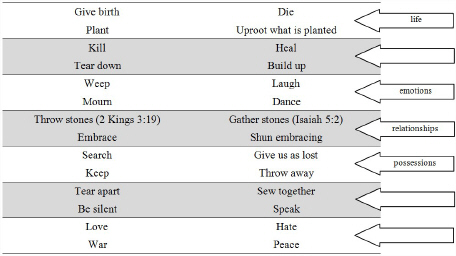7. A Time for Everything
Introduction
There is an attitude that pervades the culture in which we live… “I am the master of my fate; I am the captain of my soul.” (William Ernest Henley)… “I am my own boss”… We live in an individualistic, independent culture. We want to feel like we are in charge of our own lives. When we succeed, we conclude that it is because of our hard work. Interestingly enough, when we fail, we usually blame everyone else. It is natural for us to want to feel like we are in control of our own lives. Solomon assessed this idea of independence and informs us that it is far from reality.
Questions to Consider:
- Do you think that 3:1-8 carries a positive or negative tone?
- What is the primary purpose of stating the ‘times’ in these verses?
- What is the ‘fear of God’ referring to in verse 14?
- Is Solomon using hyperbole?
- What is a merism? What is its purpose?
- Is Solomon making a theological statement here?
Lesson
Ecc 3:1 For everything there is an appointed time, and an appropriate time for every activity on earth: 3:2 A time to be born, and a time to die; a time to plant, and a time to uproot what was planted; 3:3 A time to kill, and a time to heal; a time to break down, and a time to build up; 3:4 A time to weep, and a time to laugh; a time to mourn, and a time to dance. 3:5 A time to throw away stones, and a time to gather stones; a time to embrace, and a time to refrain from embracing; 3:6 A time to search, and a time to give something up as lost; a time to keep, and a time to throw away; 3:7 A time to rip, and a time to sew; a time to keep silent, and a time to speak. 3:8 A time to love, and a time to hate; a time for war, and a time for peace.
The list below is made up of a number of merisms. This is not meant to be an all inclusive list. It offers the extremes and assumes everything between the extremes.

These seasons of life seem to be inevitable. Some may interpret this passage as an allowance for these seasons of life, but the point is not to justify one or more of these actions in someone’s life. These verses are merely stating the reality that these seasons will come to all whether they want them or not. There are a couple of these verses that are a bit more confusing than others…
Throw Stones to Gather Stones
While there are many possible interpretations for this meaning, the best explanation seems to point at the actual act of picking up stones to cultivate a field and throwing stones in someone else’s field to ruin their field. This would parallel the following idea of embracing and refraining from embrace. It would follow that those who want to ruin you as well do not want to embrace.
Tear Apart to Sew Together
There is some confusion as to the meaning of this verse as well. It is possible that the first part of the verse is speaking of a time of mourning. When one would mourn they would tear their clothes; and when they finished their time of mourning, they would mend those clothes they had torn. If we stick with the parallels, the time of mourning would be a time of silence whereas the time following the mourning would allow for speech.
Man’s Mortality is seen in his Bondage to Time.
Ecc 3:9 What benefit can a worker gain from his toil? 3:10 I have observed the burden that God has given to people to keep them occupied.
As we view the list above we immediately see that death is a reality for everyone. This fact might be a bit more palatable if we knew for certain that our present work would profit us. And yet Solomon does not even allow us that comfort. We are told in 3:9 that even work is of no benefit. Man is on the road to death; and when he dies, everything he does in life will as well die with him. We find the origination of this plight back at the fall…
Gen 3:17 But to Adam he said, “Because you obeyed your wife and ate from the tree about which I commanded you, ‘You must not eat from it,’ cursed is the ground thanks to you; in painful toil you will eat of it all the days of your life. 3:18 It will produce thorns and thistles for you, but you will eat the grain of the field. 3:19 By the sweat of your brow you will eat food until you return to the ground, for out of it you were taken; for you are dust, and to dust you will return.”
Man ought to Accept the Seasons of Life.
3:11 God has made everything fit beautifully in its appropriate time…
Since we are bound to time, then we ought to enjoy our time here… Right? One may ask whether it is correct to say that “God has made everything beautifully in its appropriate time.” There is no question concerning some of the seasons above, but what about war and hate? What about killing and tearing down?
As well, this brief statement places the control of the seasons in the hands of God. For all of those who want to control their own lives or even think they are controlling their own lives, Solomon makes them aware of the fact that God is ordering their lives. He is in control of time. While it is possible for man to look at this statement in a positive manner, the context seems to not allow for such an interpretation. Man wants to have control. He wants to have a life filled with joy and productivity. Instead man is left with this burning desire to overcome the reality of his mortality. He works hard to accomplish much, only to leave all he has done to others when he dies – and his death is inevitable.
Therefore, the conclusion is that man ought to just be content with what seasons come into his life and accept them.
Man is unable to Accept the Seasons of Life Alone.
(NAU) Ecc 3:11 … He has also set eternity in their heart …
The problem is that man cannot be content with the seasons of life. In realizing their mortality and the uselessness of their present work, they want to believe there is more. In their heart they acknowledge eternity and their minds want to understand it.
Man is unable to Explain Why.
(NAU) Ecc 3:11 … He has also set eternity in their heart, yet so that man will not find out the work which God has done from the beginning even to the end.
They are unable to understand eternity. God has given them the desire but not the ability to understand more. They know there is something out there but they are unable to grasp it.
Man is left to resignation.
Enjoy the simple pleasures.
3:12 I have concluded that there is nothing better for people than to be happy and to enjoy themselves as long as they live
Therefore, they resign themselves to stop looking at eternity and simply enjoy the present. If man is unable to understand a greater meaning in eternity, he is left with what he can understand – his present happiness.
What do you think of the following statement? “It is significant to point out that the expression admits that what follows is not the highest, best imaginable good but life in a fallen world, which is the best humans can do under the circumstances.”1
Simple pleasures are given by God.
3:13 and also that everyone should eat and drink, and find enjoyment in all his toil, for these things are a gift from God.
Man is unable to find satisfaction in eternity because he is unable to understand eternity. Therefore, he resigns himself to the simple, present pleasures of life. The problem is that even these simple present pleasures are given by God. Man cannot in and of himself even enjoy the simple pleasures of life.
Man cannot change the above fact.
3:14 I also know that whatever God does will endure forever; nothing can be added to it, and nothing taken away from it …
The reality just stated is not going to change. There is not going to come a time where all of a sudden man becomes enlightened and is able to understand eternity and thereby find satisfaction. It is as if Solomon is telling us, “No matter how frustrating God’s world is, people must learn to put up with it.”
The desired effect is a “fear” of God.
3:14… God has made it this way, so that men will fear him.
What kind of fear is Solomon speaking of in this verse? We see that a fear of God is the beginning of knowledge or wisdom. Standing in awe of God is the appropriate response of humility that ought to characterize all man … but, is this the kind of fear of which Solomon is speaking? It seems difficult to conclude that Solomon is leading us to such a positive conclusion in the midst of such a negative outlook on life.
Questions to Consider
What points of application might be drawn from this “fate” in which we find all humanity? Is there any positive way to view God’s actions?
1. God has given us desires that can only be found in Him.
2. In the same way that we are unable to control the seasons in nature, we are unable to control the seasons of our lives. These seasons of life happen to us all. There is nothing that can be done to avoid them.
3. Solomon seems to look at the fear of God (in this passage) as a negative thing. It is appropriate for us to instead draw the conclusion that humility is the correct response as we view our mortality in the hands of God.
4. While we can find some satisfaction in the simple pleasures that God allows in our present lives, we ought to look past our simple pleasures and find satisfaction in God. How do we do that?
1 Tremper Longman, NICOT, 122


